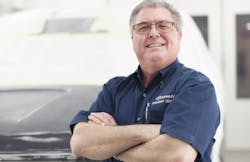For the first few decades of business, Barrett Collision Center in Abilene, Texas, relied heavily on insurance work. In fact, it made up nearly 98 percent of the work the shop did.
And while owner Rocky Champion says that DRPs were really good in the beginning—and the shop is still on one program—as they slowly changed, he felt the need to shift his business model, too.
He saw the involvement the OEM was starting to have in the repair process and the importance on repairing to OEM specifications.
“Our manufacturers are going to dictate where the cars are going to be repaired, not the insurance companies,” he says.
He wanted to start doing what the manufacturers dictated was correct. Preparing for the future, Champion knew the return on the investment he was going to make was going to be gradual, but it would eventually set his shop apart and, more importantly, he would do repairs the right way.
“I tell people that it’s your car, your choice. But at the same time, if the OEM recommends a pre- or post-scan, that’s what we need to do,” he says.
Although acquiring an attitude for change and seeing the return on his investment would be a gradual process, Champion revamped his shop’s equipment, attended rigorous training and used personalized tactics to prepare for the OEM-heavy future.
The Catalyst for Change
Champion didn’t expect his plan for the future to take place at the time it did, especially since it took a piece of equipment in his shop to break down to make him realize there was a plan to begin with.
Roughly one week before the 2014 SEMA Show, the heating element in Champion’s paint booth went out. Since it isn’t something that can be replaced, Champion’s paint rep at the time paid for Champion to go to SEMA to look for paint booths.
While purchasing new paint booths was the original objective of the trip, Champion realized his equipment was actually getting old.
“You’re doing all these things and one day you realize, I had this paint booth for 20 years, this frame machine still works but I changed the frames five years ago. Everything is still working but I have to make a change,” he says.
After purchasing two new paint booths and shopping around for good deals, he thought to himself, “If we’re going to go, we’re going to go big.”
Four hundred thousand dollars—that’s how much Champion ended up spending during the 2014 SEMA Show on brand new equipment for his shop.
With that in mind, he was able to borrow the money to purchase the following equipment:
- Two Global Finishing Solutions 30-foot drive-through paint booths
- Chief Goliath frame machine with four pull posts (360-degree capabilities)
- Chief LaserLock three dimensional measuring
- Chief Elektron aluminum repair station
- Chief Elektron aluminum and silicon bronze welder
- Polyvance nitrogen bumper repair welder
The Certifications
The 2014 SEMA Show also happened to coincide with the year Ford released its aluminum body F-150, so Champion previewed all of the necessary tools and considered certification.
He says it made sense, especially with all the money he spent. Through Assured Performance, Barrett Collision Center became certified in several manufacturers in 2015, including Hyundai, Ford, GM, Chrysler, Jeep, Fiat, Nissan, and Kia. He now has a total of six certifications.
The annual subscription of roughly $4,000 has proved worth it for several reasons. Being one of the largest independent shops in Abilene, Champion has equipment other shops simply don’t have, and paired with his certifications, he has customers flocking based on that alone.
“We just try to make it an educational experience,” he says.
The conversation with the customer covers the following:
- The damage.
- How the shop repairs.
- Discuss the equipment the shop has.
- Tell them the techs are OEM certified and what that means.
Champion says that, most of the time, they’re enlightened to learn how a vehicle is actually repaired.
He finds that when a customer shows resistance or does not fully understand the process, he’ll offer to bring them back and show them what repairing a car looks like, by saying, “I have another car similar to this [that I’m working on] if you’d like to see what we’re doing.”
About five customers per week say they found the shop because of its certifications—which he doesn’t even push for in his advertising. Champion says it’s a great marketing tool because not every shop will invest in the certification and necessary equipment.
Your Car, Your Choice
Switching to a certification model was a huge change for an insurance-heavy shop like Champion’s. And while his relationships with insurers is strong, he occasionally faces resistance when it comes to certain repairs.
Champion and some of his employees have attended training on how to combat insurers when they push back on OEM-recommended procedures.
It wasn’t too long ago when Champion had to put his new techniques to the test when an insurer refused to pay for a procedure. After simply asking for a position statement and explaining Barrett has the right equipment to do the repair, Champion received a check two days later.
“You’ve got to be nice. You can’t have an attitude, even if it’s easy to have one. Try to educate them and tell them why,” he says. “We’re not children, we are businessmen, so we have to treat each other with respect.”
He says his success with negotiations is, in part, due to the credibility of his shop. Certifications give him an opportunity to stand his ground.
Since taking the classes, printing the repair plan and the OEM repair procedure for each job has become a must.
The ROI
Champion is still paying off the equipment he purchased back in 2014, but for him, the return on his investment means a lot more than making his money back.
Making the investment shows that he cares about his technicians, he says, which in turn results in a happier staff. He has an over 90 percent employee retention rate and says when the techs have the right equipment, it makes them feel good and do the job faster.
All the new equipment meant that training had to come along with it. All of the shop’s techs are I-CAR certified in welding and the shop is I-CAR Gold, but for the most part, the equipment manufacturers have provided the necessary training.
The shop went through Chief University for the new frame machine and Polyvance came out for a few seminars. Champion says he’ll send his guys to either I-CAR or Chief for training needs.
After purchasing the equipment and obtaining his certifications, cycle time went down from six days to, now, five.
By having the equipment, the certifications and the will to perform repairs properly, it’s no surprise that 80–90 percent of Champion’s business is either repeat or referral business.
SHOP STATS: Barrett Collision Center Location: Abilene, Texas Size: 18,000 square feet Staff Size: 16 Average Monthly Car Count: 80 Annual Revenue: $2 million

